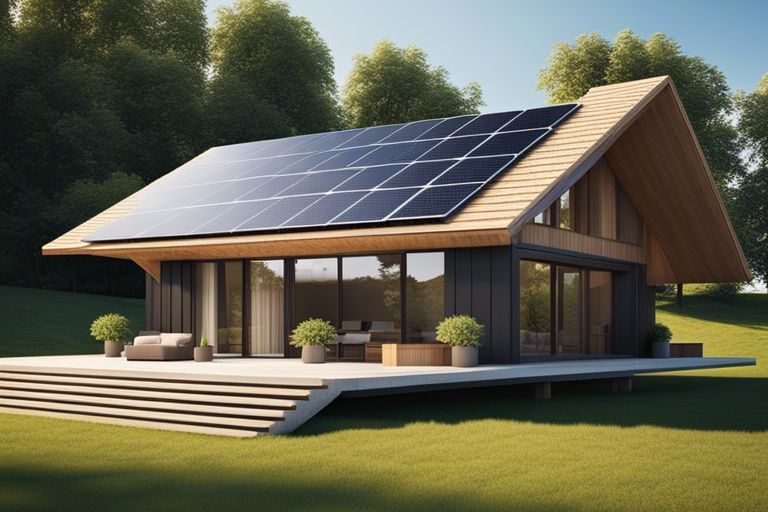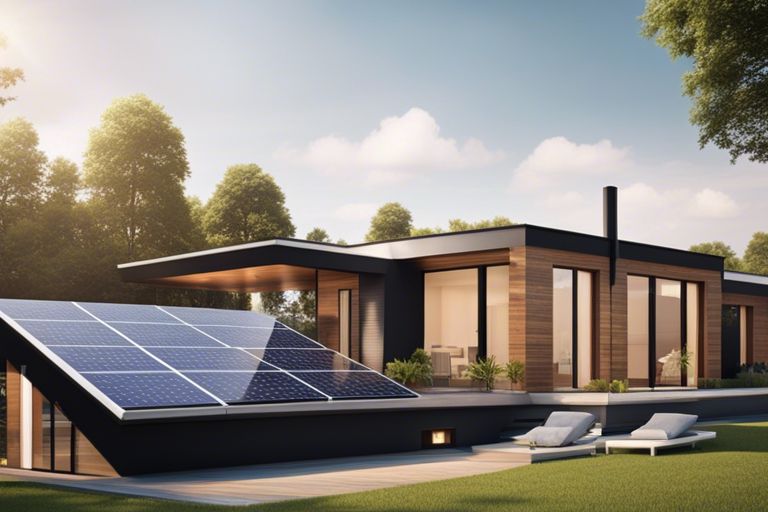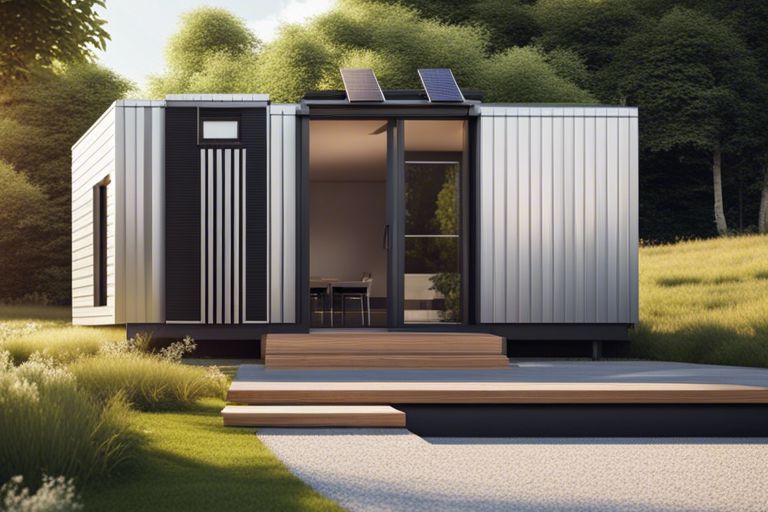Most modern homes rely on an intricate web of power sources to keep the lights on and the appliances humming. But have you ever wondered if your house could simply run on solar power alone? In this informative blog post, we will examine into the possibilities and limitations of powering your entire household with the sun’s energy. Join us as we explore the fascinating world of solar power and its potential to revolutionize how we think about energy consumption.
Key Takeaways:
- Solar panels are an crucial component needed to generate electricity from sunlight.
- Battery storage is crucial for storing excess solar energy produced during the day for use at night or during cloudy days.
- Energy-efficient appliances can help in reducing overall electricity consumption and make a house more self-sustainable with solar power.
The Basics of Solar Power
How Solar Panels Work
For thousands of years, humans have used the sun’s energy for warmth and light. Solar panels allow you to harness this energy and convert it into electricity for your home. When sunlight hits the solar panels on your roof, the panels absorb the sun’s energy and convert it into direct current (DC) electricity.
Types of Solar Panels
Solar panels come in different types, with the most common ones being monocrystalline, polycrystalline, and thin-film. Monocrystalline panels are known for their efficiency and sleek design, while polycrystalline panels are more affordable but slightly less efficient. Thin-film panels are lightweight and versatile, making them ideal for roofs that can’t support heavy traditional panels. The choice of solar panel type depends on your budget, space, and energy needs.
| Monocrystalline | Efficient and sleek design |
| Polycrystalline | Affordable but slightly less efficient |
| Thin-film | Lightweight and versatile |
When considering solar panels for your home, it’s imperative to evaluate your energy needs and the space available for installation. By choosing the right type of solar panel, you can maximize your home’s energy efficiency and reduce your carbon footprint. The type of solar panel you select will impact the overall performance of your solar power system, so it’s crucial to make an informed decision.
Assessing Your Energy Needs
Calculating Your Energy Consumption
One of the first steps in determining if your house can run solely on solar power is to calculate your energy consumption. Start by looking at your electricity bills from the past year. Note the average kilowatt-hours (kWh) used per month. This will give you an idea of how much energy you typically consume.
Identifying Energy-Intensive Appliances
Assessing your energy needs also involves identifying energy-intensive appliances in your home. These are devices that consume a significant amount of electricity and may have a big impact on your overall energy usage. Common energy-intensive appliances include air conditioners, electric water heaters, pool pumps, and clothes dryers.
This step is crucial because it helps you understand which appliances contribute the most to your energy consumption. By prioritizing energy-efficient upgrades or alternatives for these appliances, you can reduce your overall electricity usage and make it easier to power your home with solar energy.
Sizing Up Your Solar Panel System
Determining the Required System Size
Many factors play a role in determining the size of the solar panel system you will need to power your home. Your average daily energy consumption, the peak sunlight hours in your location, and the efficiency of the solar panels all need to be considered.
Factors Affecting System Efficiency
Your system’s efficiency can be affected by various factors such as the angle and orientation of your roof, shading from nearby trees or buildings, and the temperature at which the solar panels operate. To maximize efficiency, it is important to install your solar panels in a location that receives ample sunlight throughout the day.
- Choose a location with minimal shading for optimal sunlight exposure.
- Ensure your solar panels are angled correctly to capture the maximum amount of sunlight.
Determining the most efficient location for your solar panels is crucial in ensuring that your system generates enough electricity to power your home. Assume that a well-placed, unobstructed solar panel system can operate at around 80% efficiency.
To Conclude
It’s crucial to carefully consider all the factors that can impact the efficiency and size of your solar panel system when planning to power your home with solar energy. By determining the required system size based on your energy consumption and considering factors that affect efficiency, you can ensure that your solar panel system operates optimally and effectively.

Overcoming Energy Storage Challenges
All Wondering How Many Solar Panels You Need? Here’s a … about solar power systems require an effective energy storage solution to ensure a constant supply of electricity, even when the sun isn’t shining. The amount of energy your solar panels can generate during the day might exceed your immediate needs, so having a way to store that excess energy for use at night or on cloudy days is crucial.
The Role of Batteries in Solar Power Systems
Systems that rely on solar power typically use batteries to store excess energy generated during the day. These batteries store the surplus energy and make it available for use when the solar panels aren’t producing electricity. Battery technology has advanced significantly in recent years, with options like lithium-ion batteries offering high efficiency and long lifespan for reliable energy storage in solar power systems.
Advantages and Limitations of Energy Storage
Energy storage systems have the advantage of providing a dependable source of electricity, even when solar production is low. They allow you to reduce your reliance on the grid and can potentially save you money on your energy bills over time. However, energy storage systems can be expensive to install initially, and the capacity of the batteries may limit the amount of energy you can store at any given time.
Understanding the advantages and limitations of energy storage in a solar power system is imperative for realizing the full potential of renewable energy in your home. By carefully considering your energy needs and the capabilities of your storage system, you can optimize your solar power setup for maximum efficiency and cost-effectiveness.

Integrating Solar Power with Your Home
Once again, the idea of powering your home with solar energy may seem daunting, but with the right knowledge and equipment, you can seamlessly integrate solar power into your daily life. When considering solar power for your home, you’ll come across two main types of systems: grid-tied systems and off-grid systems.
Grid-Tied Systems vs. Off-Grid Systems
On the one hand, grid-tied systems are connected to the main power grid, allowing you to supplement your electricity needs with solar power while still being able to draw electricity from the grid when needed. This setup provides you with a reliable source of power and the potential to save on electricity bills. On the other hand, off-grid systems are entirely self-sustaining and do not rely on the main power grid. While this offers independence from utility companies, it requires careful planning to ensure you have enough power stored for times when the sun isn’t shining.
Net Metering and Feed-In Tariffs
For homeowners with grid-tied systems, net metering and feed-in tariffs are important aspects to understand. Net metering allows you to sell excess electricity generated by your solar panels back to the grid, offsetting your electricity costs. Feed-in tariffs, on the other hand, provide financial incentives for the electricity you contribute to the grid. These policies can not only save you money but also make solar power more economically viable in the long run.
Power companies often offer different rates and incentives for homeowners who generate their electricity from renewable sources like solar power. By taking advantage of net metering and feed-in tariffs, you can make your solar power system even more cost-effective while contributing to a cleaner, more sustainable energy future. It’s a win-win situation for both you and the environment.
Addressing Common Concerns
Dealing with Intermittent Energy Supply
Now, one of the common concerns with relying solely on solar power is the intermittent nature of energy supply. Being dependent on the sun means that energy production can fluctuate based on weather conditions and time of day. However, this issue can be addressed by implementing energy storage solutions such as batteries. By storing excess energy generated during sunny periods, you can ensure a steady and reliable power supply even when the sun isn’t shining.
Maintenance and Repair Considerations
Considerations about maintenance and repairs are also valid when it comes to running a house on solar power. While solar panels are designed to be durable and require minimal maintenance, it’s important to factor in occasional cleaning and inspections to ensure optimal performance. Additionally, in the rare event that a component malfunctions, you may need to call a professional for repairs.
To ensure the longevity and efficiency of your solar power system, it’s advisable to schedule regular maintenance checks and promptly address any issues that may arise. By staying proactive and attentive to the needs of your solar panels, you can maximize their effectiveness and enjoy sustainable energy for years to come.
To wrap up
Drawing together all the information presented in this article, it is clear that while it is technically feasible for a house to run solely on solar power, there are several factors to consider before making the switch. You can explore more about the possibilities and limitations of powering your entire house with solar panels by reading Can I Power My Whole House With Solar Panels?. Keep in mind, making the transition to solar energy requires careful planning, proper installation, and a commitment to sustainability to truly reap the benefits of this renewable energy source.
Q: Can a house run entirely on solar power?
A: Yes, a house can run entirely on solar power through the installation of solar panels on the roof or in the yard. Solar panels convert sunlight into electricity through photovoltaic cells, which can then power the home’s electrical systems, appliances, and heating/cooling systems.
Q: What are the benefits of running a house on solar power?
A: There are several benefits to running a house on solar power, including reduced electricity bills, environmental sustainability, and energy independence. Solar power is a renewable energy source that reduces reliance on fossil fuels, lowers carbon emissions, and can even generate income through net metering programs.
What factors should be considered when installing solar panels for a house?
A: When installing solar panels for a house, factors to consider include the location and orientation of the property, the amount of sunlight received throughout the year, the available roof space for panels, local regulations and incentives for solar power, and the upfront cost of installation versus long-term savings on electricity bills.
Can you sell power back to the grid in Oregon
